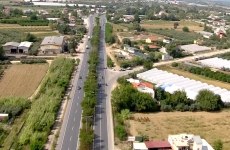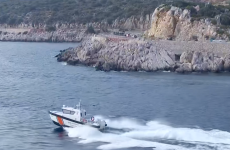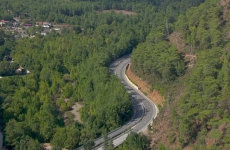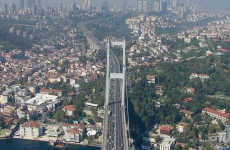Description
October 10, 2023
Tour of Turkey 2023 🇹🇷 – Stage 3 – Fethiye – Babadağ : 104,1 km
Usually falling between the cobbled Classics and the Ardennes Classics,
Show more...
October 10, 2023
Tour of Turkey 2023 🇹🇷 – Stage 3 – Fethiye – Babadağ : 104,1 km
Usually falling between the cobbled Classics and the Ardennes Classics, the Presidential Cycling Tour of Turkey takes place in October this year after an earthquake hit the region in February. Despite being postponed until the Autumn, the eight-day race still offers something for both sprinters and climbers alike. The race debuted back in 1963 and has slowly climbed its way up cycling’s hierarchical racing calendar, rising all the way up from a 2.2 event in 2007 to WorldTour status in 2017. It has since been relegated however and from 2020 onwards it has formed part of the UCI ProSeries – the second-tier on pro cycling’s racing calendar. The Tour of Turkey has followed an eight-stage format for the majority of its editions and has largely toured the western edge of the country, following the Mediterranean coast north towards the former capital, Istanbul, or south towards the popular tourist destination of Antalya. The mountains they climb here aren’t known for their altitude, but rather their length. This makes them fantastic training grounds for those riders who would be eyeing up the impending Giro d’Italia when the race is traditionally held in the spring.
Alexey Lutsenko (Astana Qazaqstan) took a stunning solo win on stage 3 of the Tour of Turkey finishing alone on the brutally-difficult summit finish at Babadag, ahead of German Ben Zwiehoff (Bora-Hansgrohe).
The Kazakh National Champion and former Tour de France stage winner dropped Zwiehoff near to the finish of the mammoth 18-kilometre ascent to seize both the day’s honours and the overall lead.
Zwiehoff came home around 20 seconds back while Harold Tejada (Astana Qazaqstan) finished third on the eight-day race’s toughest single climb, which took around an hour to tackle.
Astana and Bora shredded the remnants of the peloton by half way up the Babadag, with Lutsenko biding his time for one major, stage-winning acceleration less than one kilometre from the line.
“That last climb was incredible, the longest I’ve done in my career and very hard, but I’m happy with my result,” Lutsenko, the winner of the Summer Asian Games time trial in Hangzhou, China less than a week before the start of Turkey, said afterwards.
“It was hard for me on stage 1 and stage 2 because I was still recovering from travelling here from China, but today went well.”
Asked if he could now keep the lead all the way to the finish next Sunday, Lutsenko – second overall and a stage winner in Turkey back in 2018 – pointed out that “today is just stage 3, tomorrow is hard. I’m very happy I won here, but I’ll give it everything to take it overall as well.”
With sprinters like former race leader Jasper Philipsen (Alpecin-Deceuninck) way out of the picture for the daunting final ascent of Babadag, Astana Qazaqstan, and then Bora-Hansgrohe, led a peloton of 30 riders to the foot of the ascent. Despite a very early move by Alexis Guerin (Bingoal-WB), given the sheer length of the climb, Bora put down a steady rather than searing pace to ensure the French all-rounder was kept under control.
Riding through intense, late afternoon heat, UAE Team Emirates added their support on the relentlessly demanding slopes thanks to Domen Novak, while Guerin, impressively, continued to forge on as sole leader. The tougher middle segment then squeezed the main group down to just nine, and there was a surprise when one top favourite Jay Vine (UAE Team Emirates) abruptly disappeared from the running, forcing Novak to drop back to lend support.
UAE’s virtual self-destruction all but coincided with Guerin being caught by a four-man group containing Florian Lipowitz, Zwiehoff (both Bora-hansgrohe), Lutsenko and Tejada (both Astana Qazaqstan). Guerin stubbornly swung on and off the back of the group but it was abundantly clear these four riders, all tied on GC at 24 seconds before the stage, were the main candidates for the win.
The final attacks began in the last 8km when the riders hit a lengthy cobbled section, as Zwiehoff made a sustained charge that caused his teammate Lipowitz to struggle. Tejada responded in kind, and a much briefer acceleration followed by Lutsenko on the rougher, twisting, surfaces near the summit. However, even with the ramps rearing up to 18% in places, initially neither of the Astana riders seemed able to keep Lipowitz completely at bay.
When Tejada definitively settled into a team worker’s role, it proved something of a game changer, the Astana duo finally seeing off Lipowitz. Zwiehoff accelerated away 2km from the summit, but his eagerness proved a two-edged weapon as Tejada fell behind but Lutsenko refused to be shaken off.
The Kazakh’s canny racing and ability to calculate his strength ultimately proved too much for Lipowitz to handle as Lutsenko then slowly hauled himself away from the German in the last 800 metres, conquering one of road cycling’s toughest ascents as he did so.
Results :
















